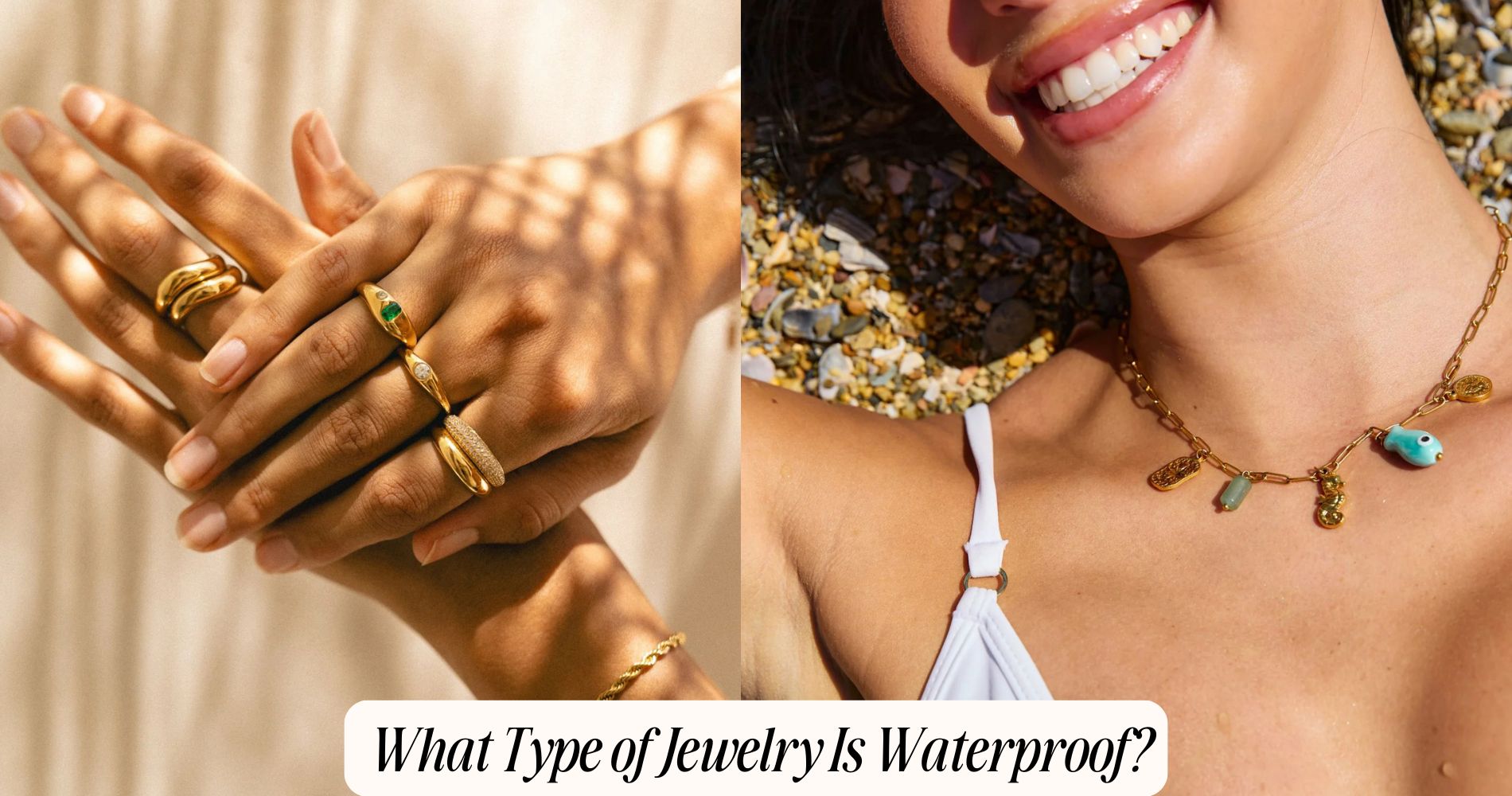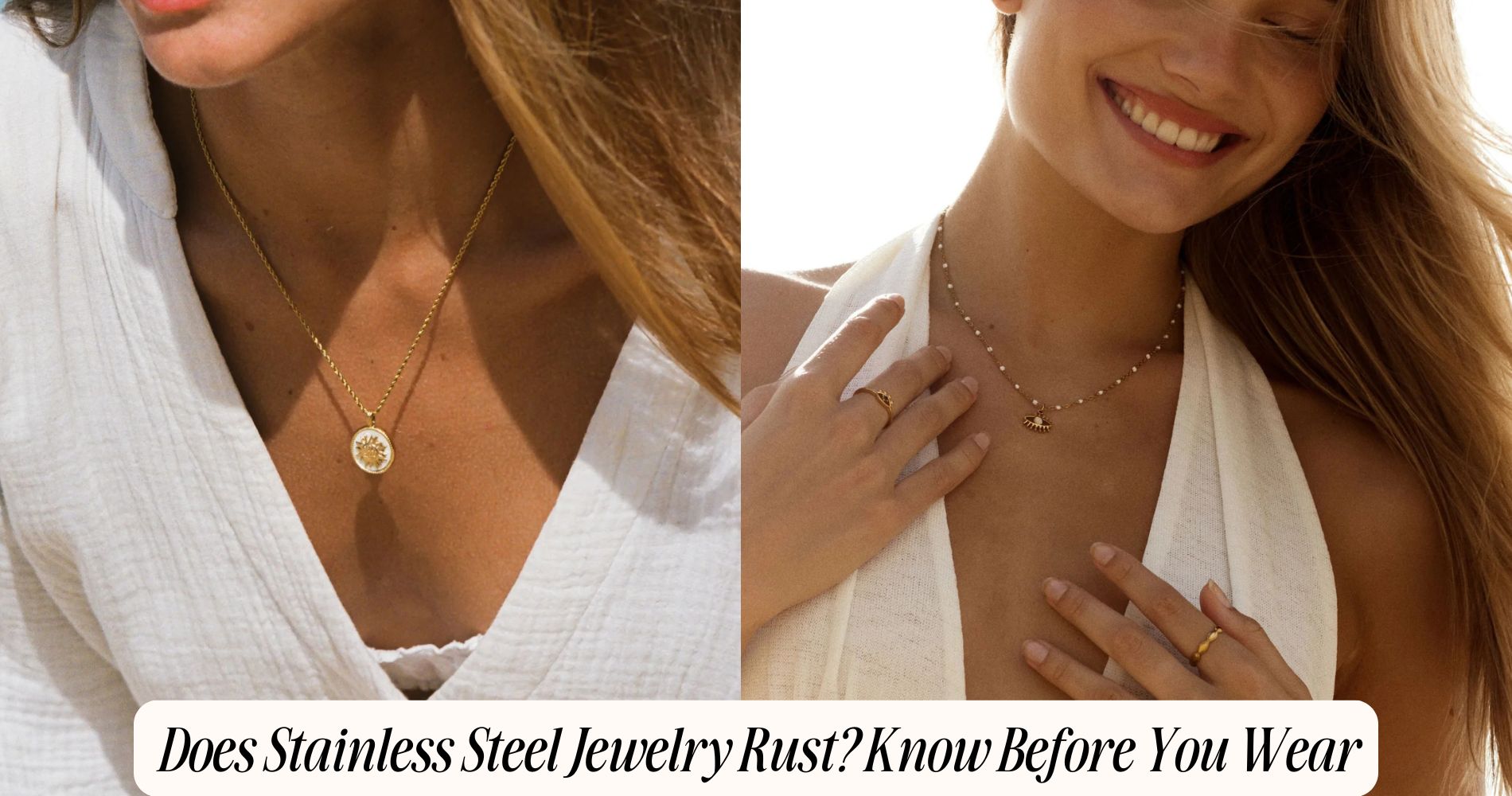
What Type of Jewelry Is Waterproof?
Wondering what type of jewelry is waterproof? Stainless steel, solid gold, platinum, silicone, and resin are some of the best options. These materials resist tarnish, rust, and corrosion—even with frequent water exposure. Stainless steel and platinum are especially durable, while solid gold won’t tarnish like gold-plated pieces. Silicone and resin offer flexible, stylish, and low-maintenance choices. Just rinse them with mild soap and dry thoroughly after water contact. To explore these options and get tips for long-lasting shine, check out our waterproof jewelry collection and keep going.
Stainless Steel: A Durable and Water-Resistant Choice
Because of its unique alloy composition, stainless steel stands out as a highly durable and water-resistant option for jewelry. You’ll find that this material resists tarnish, rust, and corrosion, thanks to its chromium content, making it ideal for daily wear—even in water.
Stainless steel adapts well to changing fashion trends, offering a sleek, modern appearance while maintaining structural integrity. From a technical standpoint, it’s hypoallergenic and retains its finish with minimal care. Simply wipe your jewelry clean and avoid harsh chemicals to preserve its shine.
If you care about environmental impact, stainless steel is fully recyclable, reducing waste compared to less sustainable materials. For waterproof jewelry that aligns with both style and eco-conscious values, stainless steel remains a top contender.
Solid Gold vs. Gold-Plated Jewelry in Water
While stainless steel excels in water resistance, many people also consider gold jewelry for daily wear. When comparing solid gold and gold-plated pieces, you’ll notice key differences in water durability.
Solid gold, especially 14k or 18k, won’t tarnish or corrode with water exposure, making it suitable for frequent wear—even in the shower. Gold-plated jewelry, however, features a thin layer of gold over a base metal. Water can cause this layer to wear off, exposing the less durable metal underneath.
If your jewelry features intricate diamond cuts or gemstone settings, solid gold offers greater security since water can’t degrade its structure. For gold-plated pieces, moisture can loosen prongs or settings over time.
To ensure longevity, always dry your jewelry thoroughly after water exposure.
Platinum: The Ultimate Waterproof Metal
If you’re searching for jewelry that truly withstands water exposure, platinum stands out as the ultimate choice. This precious metal offers unparalleled material durability—it resists tarnish, corrosion, and discoloration, even if you wear it daily in the shower, pool, or ocean.
Platinum’s dense structure ensures it won’t degrade or lose its luster over time, making it a smart investment if you value longevity. In recent fashion trends, platinum jewelry is prized for its modern, understated elegance and ability to complement any style.
To maintain its brilliance, simply clean your platinum pieces with mild soap and water, then dry with a soft cloth. You don’t need frequent professional care, as platinum retains its shine and structure through years of consistent wear.
Silicone and Resin: Trendy and Waterproof Alternatives
Although many associate waterproof jewelry with metals, silicone and resin options provide stylish, practical alternatives that excel in wet environments. Silicone jewelry, known for its flexibility and hypoallergenic properties, resists water absorption and stands up to repeated exposure without warping or fading.
Resin, on the other hand, offers a glass-like appearance while forming a watertight barrier around embedded designs or inclusions, making it popular in current fashion trends. Both materials rank high in material sustainability, especially when sourced responsibly or recycled.
To maintain their luster, you should rinse silicone and resin pieces with mild soap and water, avoiding harsh chemicals that can dull finishes. Store them away from direct sunlight to prevent discoloration, ensuring your waterproof accessories remain vibrant and durable for daily wear.
Sterling Silver: How It Holds Up Against Water
Because sterling silver contains 92.5% pure silver alloyed with 7.5% other metals—typically copper—it reacts differently to water compared to truly waterproof materials. When you expose sterling silver to moisture, the copper component makes it susceptible to oxidation, which leads to tarnishing.
Unlike stainless steel or gold, sterling silver doesn’t offer complete oxidation resistance, so repeated contact with water accelerates tarnish formation. While silver itself resists corrosion, the alloyed metals reduce this property.
To enhance tarnish prevention, some sterling silver jewelry features rhodium plating, but this layer can wear off over time. If you want your sterling silver pieces to maintain their shine, it’s best to limit their exposure to water.
Regular drying and storage can help prolong their appearance and durability.
Caring for Your Waterproof Jewelry
While sterling silver demands extra care around water, waterproof jewelry offers a more resilient option for everyday wear. However, you’ll still need to follow specific care tips to maintain its durability and shine.
Start by rinsing your jewelry after saltwater or chlorinated exposure to prevent buildup on metals like stainless steel or titanium. Use a mild soap and soft cloth for cleaning, avoiding harsh chemicals that can degrade protective coatings, such as PVD or gold plating.
Regularly inspect clasps and settings for signs of wear. Incorporate maintenance routines, like storing pieces in dry, soft pouches to prevent scratches.
Even though waterproof materials resist tarnish and corrosion, periodic professional cleaning helps preserve their original luster and ensures longevity for your favorite pieces.
Frequently Asked Questions
Can Gemstones Withstand Water Exposure Like Metals Can?
You shouldn't assume gemstones match metal corrosion resistance. Gemstone durability varies—diamonds and sapphires handle water well, but softer stones like opals and pearls don't. Always research your gemstone's properties and limit exposure to prolong its integrity.
Is Waterproof Jewelry Safe to Wear in Saltwater Pools?
If you wear waterproof jewelry in saltwater pools, you should still prioritize jewelry care. Even durable materials like stainless steel or silicone can suffer corrosion or buildup. Rinse thoroughly and inspect regularly to maintain material durability and appearance.
Does Waterproof Jewelry Cause Skin Irritation?
You might experience skin irritation from waterproof jewelry if you have skin sensitivity. Choose pieces made from hypoallergenic materials like titanium or surgical steel. Regularly clean your jewelry to prevent buildup that could trigger allergic reactions or discomfort.
Are There Waterproof Options for People With Metal Allergies?
You’ll find waterproof options made from hypoallergenic materials like titanium, medical-grade stainless steel, or silicone. These allergy friendly designs resist corrosion and minimize skin reactions. Clean your jewelry regularly to guarantee long-lasting comfort and durability.
How Does Chlorine Affect Waterproof Jewelry Materials?
When you expose waterproof jewelry to chlorine, you challenge its chemical resistance and material durability. Even durable materials like stainless steel or titanium can degrade over time, so rinse your jewelry thoroughly after swimming to maintain its integrity.
Conclusion
When choosing waterproof jewelry, stick with stainless steel, solid gold, platinum, silicone, or resin for maximum durability. These materials resist corrosion and won’t tarnish with regular water exposure. Be cautious with sterling silver and always avoid gold-plated pieces in water, as their thin coatings wear off quickly. To keep your waterproof jewelry looking its best, rinse after swimming, dry thoroughly, and store properly. You’ll enjoy stylish, low-maintenance accessories that stand up to daily wear.
























Leave a comment
This site is protected by hCaptcha and the hCaptcha Privacy Policy and Terms of Service apply.